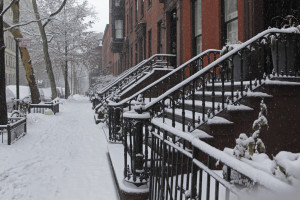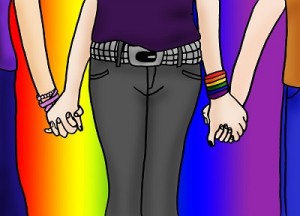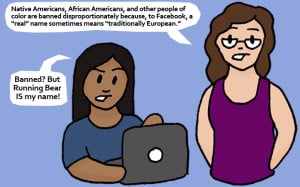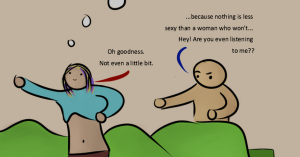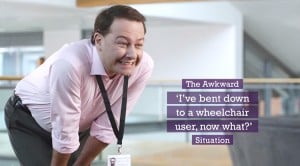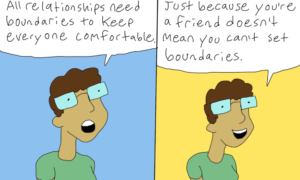Originally published on xoJane and republished here with their permission.
How many times this winter have you read some commentary about how cold it is or how much snow we’re getting? How many times have you had to rush out to the grocery story because the weather report suggested preparing for yet another snow apocalypse?
I’ve read about shortages of bread and enterprising children attempting to make pocket money shoveling snow until the cops put a stop to it. I’ve even read about people placing ads on Craigslist to find a cuddle buddy to stay warm with during a snowstorm.
What I haven’t read about is how disabled people negotiate the snow or a storm.
There are many ways to be disabled, but few real ways to talk about it. The few times disability does enter the public discourse, much of the conversation is filled with platitudes.
Disabled people are either seen as pathetic because they aren’t able-bodied, or brave for actually living in their own bodies. Seldom do disabled people actually control the narrative on our own lives.
This isn’t surprising because, despite all the rhetoric in the media about equality, disability is largely invisible unless it’s the story of some Super Crip, leaping over tall buildings with a single bound and moving faster than a speeding bullet so that we won’t inconvenience some able-bodied person’s enjoyment of the world. Who needs accommodations when we can just give each disabled person a cape?
A Super Crip is someone who makes it easy for the able-bodied because they never ever let disability stand in their way. A Super Crip doesn’t succumb to pain or limitations, they simply soldier along and sometimes even go above and beyond to give the appearance that the ableist structure of the world isn’t hard to negotiate every day. It’s always the Super Crip that you see in the special interest pieces on the six o’clock news, putting a so-called brave face on disability.
“Crip” removes the personhood from disabled people, leaving behind a body the world perceives as broken. It hides the reality that the issue isn’t a defective body but a defective world which won’t make small changes to allow greater access and a better quality of life.
One of the worst times to be pushed into the Super Crip persona is during the winter.
Just like everyone else (okay – except for winter sports enthusiasts who no one really likes), we Super Crips hate the cold, the damp and how short the days are.
The difference is that for us, winter complicates our already difficult daily negotiations with the world.
Nine years ago, I developed three chronic conditions which shifted my identity from able-bodied and privileged to disabled and cranky. Two years ago, I also suffered a minor stroke, which left me with chronic fatigue.
Even if I raise a sword in the air and proclaim my actions to be “For the honor of Grayskull,” there will be no magical shift into a kickass disabled super hero by choice. There is only a cranky woman who gives the finger to each home that she manages to struggle past without a shoveled sidewalk.
Even this can be exhausting because the frequency with which people refuse to shovel their sidewalks means that my finger is constantly raised in a cranky salute. I considered giving each house the side eye as I passed by, but I think giving the finger is far more eloquent.
I suppose it’s fair then to say that I will willingly rise above, as long as it involves giving the finger to those who don’t think about the mobility of others.
Depending on where I am going and how long I will be forced to stand on my feet, I alternate between a cane and a walker. I have largely given up on using a disability scooter in the winter, after being stuck one too many times on the sidewalk.
Being stranded on the sidewalk, waiting for some kind stranger to help push you out of the snow, is not a great winter adventure.
People always seem to appear to hold a door when I don’t need their help, but when it comes to pushing a disability scooter, (amazingly!) they’re nowhere to be found.
Even though I need aids like walkers and canes to walk, I am aware that I have privilege. If I were a full time wheelchair user, the lack of a shoveled sidewalk would force me onto the road. With conditions like black ice and poor visibility, the road is a dangerous place to be. Each time I see a disability scooter on the road, it reminds me of just how invisible our needs are and the fact that the disabled are seen as an inconvenience.
I recently had to walk to the bank to get the money to pay my rent. This should have been a really short walk, but for me, it was like participating in a marathon without all the crowds cheering me on.
It’s hard enough to have to struggle to push a walker through the snow, without then having to lift it and precariously balance it on a snowbank because some genius decided that keeping a curb cut clear was not a priority.
Did it even occur to these people that the function of curb cuts is to increase mobility rather than decrease it? Each time I lifted my walker and took a step, I had visions of falling flat on my face in what had become an ice mountain.
Walking over snow and climbing over snowbanks isn’t just an inconvenience for me and for other disabled people; it’s a risk to our health and safety. It’s absolutely exhausting.
When I think about the fact that my monthly trek will increase to daily outings, if Canada Post stops doing home delivery of mail, it depresses me. If the Canadian government cannot see beyond dollars and cents, what hope is there that the average citizen will?
Canada Post is willing to make an exception for people who have medical proof that picking up their own mail will be difficult, but what I see is just one more hoop for me to jump through.
When you are disabled, your life is filled with gatekeepers who get to decide if your disability is real. Disability is the one identity that needs to be proved repeatedly and signed off by others.
Getting the waiver means climbing over more snow and ice covered curb cuts and struggling across snow neglected sidewalks. To even get the disability waiver they offer, I will once again have to play Super Crip.
When I was able-bodied, I had no idea what disabled people go through on a typical day, and instead, my head was filled with the quintessential patronizing clap-trap about being helpful. I didn’t see the ways in which the world was not built to accommodate the disabled or the various ways in which I contributed to that.
Today, in my alternate identity of cranky Super Crip lady, I see it all too well. When I see the pictures on Facebook of people standing next to snowbanks that are taller than they are, I know that they don’t think for a moment about how the ability to simply stand next to the snow bank marks their body and evidences the ease with which they negotiate the world.
Like everyone else, I cannot wait for spring, but for me it’s not only about wanting some warmer weather. It’s about being able to walk through this world without feeling that each step is a test of my endurance.
[do_widget id=’text-101′]
Renée Martin is a freelance writer and the executive editor of the blog Womanist Musings and co-creator of the blog Fangs for the Fantasy. In between chasing her lovely two children around and feeding the dog, much of her work is dedicated to discussing everyday issues from a social justice perspective.

Search our 3000+ articles!
Read our articles about:
Our online racial justice training
Used by hundreds of universities, non-profits, and businesses.
Click to learn more


